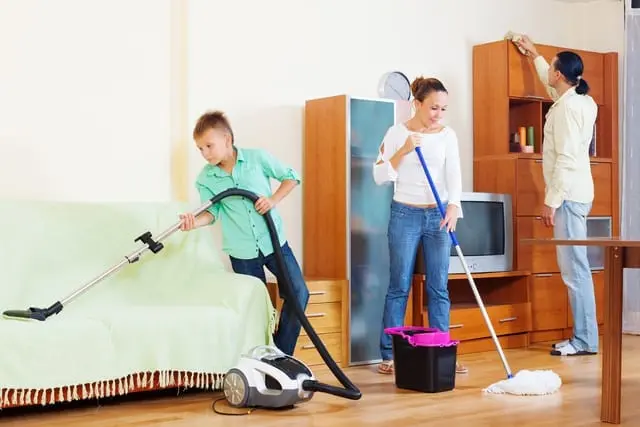Contents
Children and household responsibilities: how to raise a little helper
The love of cleanliness and order, alas, is not inherited. Therefore, good habits should be developed at an early age. How to teach a child to work? We are looking for effective approaches through joint efforts.
Education by work

Is it necessary in principle to assign household duties to the child? Many parents answer this question negatively, preferring to invest as much as possible in the spiritual, intellectual or physical education of their children. However, household chores are also an important part of education, which is not limited to just cleaning the house and washing dishes. First of all, domestic work creates a sense of self-discipline and the ability to perform routine work, which is an integral part of school activities. A sense of pride from the work done around the house, even if it is insignificant, strengthens the baby’s self-esteem. At the same time, he learns to appreciate parental work and joins adult life. A small joint cleaning in the room or preparing a family dinner instill in the child the ability to work in a team, without which life is also not enough. And psychologists say that housework is a great way to relieve tension and calm down an energetic fidget.
All ages are submissive to labor

You can teach your baby to do household chores at any age, and the earlier, the better. Such classes perfectly develop fine motor skills and other necessary skills. You can start already from one year old. At this stage, of course, you should limit yourself to the simplest tasks. Ask your child to put the toys in a box or throw the paper in the trash. From the age of two, you can start more complex tasks. Carefully fold your clothes, clean up the dishes, wipe the table with a napkin – these skills will be very useful, especially if you plan to send your baby to kindergarten. Starting from the age of three, you can gradually expand the range of responsibilities. Invite your child to help carry the purchases from the store. Let it be a small bag of fruit or a loaf of bread. At the same age, you can start learning some repetitive duties, for example, watering flowers, feeding fish, taking out small garbage.
Patience and hard work

The principle of “the child sees-the child does” is one of the main principles in education. Babies literally from the cradle begin to learn this world by imitation, and a personal example in this case works flawlessly. At the same time, it is important to do household chores together, even if at first the baby will participate only as an observer. Have you decided to make soup? Let the child enjoy the process from the first row. In addition, it is quite possible to trust him to sort out the cereals or stir the soup.
It is important to understand that the help of the baby at first will bring continuous inconvenience. Sometimes the dishes behind it will have to be washed or re-cleaned in the room. Do not be angry or complain, because experience, as you know, is the son of difficult mistakes. It is better to praise and encourage the child, noting the slightest success. And in no case do not punish the baby with labor for wrongdoing or disobedience. This is the fastest way to develop a persistent hatred of homework. It is very important to approach the performance of routine duties playfully. Turn washing dishes into bathing magic cups, and cleaning-in search of pirate treasure. An inspired and interested child will definitely start working with enthusiasm.

Patience, ingenuity and our simple recommendations will help you grow a real assistant. You can check it yourself, and at the same time share your own secrets of education.









